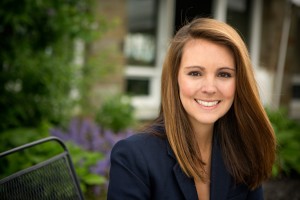 Caroline Butler graduated from CIPA in May of 2015 with a concentration in Public and Nonprofit Management. She is now employed as a Prospect Researcher for the U.S. Olympic Committee, and is based at their headquarters in Colorado Springs, Colorado. While at CIPA, Caroline served as the director of the student organization known as CIPA-NOLA (the CIPA-New Orleans Professional Partnership) and completed her Capstone project for the New Orleans Redevelopment Authority (NORA).
Caroline Butler graduated from CIPA in May of 2015 with a concentration in Public and Nonprofit Management. She is now employed as a Prospect Researcher for the U.S. Olympic Committee, and is based at their headquarters in Colorado Springs, Colorado. While at CIPA, Caroline served as the director of the student organization known as CIPA-NOLA (the CIPA-New Orleans Professional Partnership) and completed her Capstone project for the New Orleans Redevelopment Authority (NORA).
Why CIPA? There are a lot of MPA programs around—what made you choose CIPA over other programs you were considering?
I chose CIPA for the flexibility of its curriculum and emphasis on experiential leaning. CIPA afforded me the freedom to customize my learning and tailor my degree to my specific interests and career goals. Furthermore, the wealth of courses (and student groups) offering the opportunity to do work in the filed allowed me to apply concepts learned in class while gaining valuable professional experience that helped me prepare for a career working with nonprofit organizations.
What are your long-term career goals? How did CIPA help prepare you for these?
My ultimate goal is to hold a leadership position with a large arts and cultural organization, managing community and or government relations. CIPA helped to build my quantitative and analytical skill set, and develop an understanding of economics, finance and strategic planning fundamental to managerial roles. Coursework and student groups at CIPA gave me practical experience working with diverse teams on complex projects, and afforded me opportunities to develop valuable leadership skills.
What made CIPA a good fit for you?
CIPA was a good fit for three reasons. First, it offered the right blend of structure and freedom; required foundational coursework ensured that I learned the fundamentals of public administration, while elective courses in my concentration allowed me to develop marketable skills in my particular field of interest. Second, having a few years of work experience, I wanted a program that would help me develop the skills necessary to advance my career. CIPA’s emphasis on field work and practical experience provided the type of learning I was looking for. Finally, engaging with my peers and being active in the community was important to me, and the diverse array of student groups and extra curricular activities provided an abundance of unique opportunities to work with my fellows on projects on campus, in Ithaca and beyond.
Are there any particular “stand out” experiences at CIPA that made a lasting impact on you?
Serving as the Student Director of the Cornell and New Orleans Partnership Program (CIPA-NOLA) was both the most challenging and rewarding experience of my time at CIPA. Through the CIPA-NOLA program, a delegation of students travels to New Orleans during spring break to conduct research on a topic of their choice by interviewing a variety of local stakeholders. The 2015 trip was a success; the delegation gathered valuable information and developed relationships with non-profit, public and private organizations in the City, while also leaning about its rich culture and heritage. Directing the program was an invaluable leadership experience, through which I have learned much about program management both from my successes and mistakes. Helping to guide my fellows as they developed a research topic, traveled to New Orleans, and interviewed professors, civil servants and entrepreneurs demonstrated to me the talent, tenacity and intellectual curiosity of my peers, and ultimately instilled in me a deep sense of confidence in the abilities of my fellows and myself.
Can you describe the role that the Capstone played in your educational experience at CIPA?
For my capstone project, I worked with the New Orleans Redevelopment Authority (NORA) to assess the impact of a vacancy reduction program funded by a grant from the federal government. Capstone was one of the most valuable courses I took during my time at CIPA as it required me to apply skills and concepts learned in class to real world situations. Drawling from previous coursework in statistics and evaluation, my team gathered data and performed statistical analysis to determine what impact NORA’s work was having in specific neighborhoods. Furthermore, working directly with a client helped to refine my communication skills and professionalism, and taught me the importance of transparency and collaboration.
How would you describe the sense of community you find at CIPA?
I found the CIPA community to be very open and accepting. The student body is remarkably diverse yet, despite differences in culture and background, my class was generally cohesive; people were respectful, curious and eager to learn about and from their peers. As a result of CIPA’s welcoming community, I made friends from all over the world who have given me a new appreciation and perspective for the social and civic issues that I came to CIPA to study.
